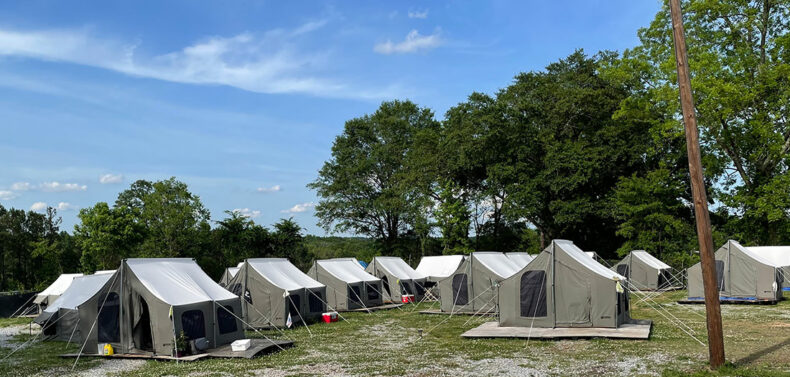The First Step homeless community has provided a safe place to camp for 55 people at a time since March of last year, but it’s scheduled to close permanently at the end of the month. Most residents have already left the camp, some transitioning to hotel rooms funded by Athens-Clarke County through the federal American Rescue Plan Act.
Of those remaining, most will leave this week as the camp continues winding down. First Step stopped accepting new residents on Sept. 30, and everyone at the camp was given a 60-day notice to vacate on or around Oct. 1.
Where Will Residents Go?
In October, the ACC Commission extended a hotel voucher program started by the nonprofit Advantage Behavioral Health Systems in 2020. This program has allowed a rotating group of 25 people experiencing homelessness to stay in hotels as they work to improve their lives. The program was set to expire in December, but will now run through April at the cost of $277,288 from ARPA.
Some of the most vulnerable First Step residents have already moved into hotel rooms, and they’ll be joined by another 15 people over the next two weeks, according to John Morris, the THRIVE community programs team leader for ABHS. Together with a few people from outside of the First Step community, the hotel program will be full after accepting these 15.
Morris said he hopes that many of the residents now moving into hotel rooms will be able to find housing before the end of April, and his team has been working in collaboration with First Step staff and the ACC Housing and Community Development Department to make that happen.
“In the past two months, it’s been all hands on deck—a lot of collaboration, increased communication, and we’re having good results,” Morris said. “People are going and getting their behavioral health assessments and engaging in services with Advantage. For some people, that is a huge step for them and opens the door for multiple housing tracks for them. When we have clients who aren’t holding up their end, First Step is supporting and following up with them. That’s where I think a lot of these great outcomes are coming from.”
The difficult task has been made a little easier since October, when some First Step residents started leaving the camp for various reasons. Some residents have gone into recovery programs, some have left Athens to reunite with family, some have been discharged for breaking camp rules and others have been able to find housing.
So many people have left due to normal ebb and flow that after the next 15 residents fill the remaining hotel slots, there will only be seven residents left who will be ejected from the camp without knowing where they will be sleeping that night. Morris said that his team will keep in contact with the final seven residents over the next few months, and they’ll be first in line for a hotel spot if one comes available.
However, some of them don’t actually want a hotel room even as nighttime temperatures drop towards freezing.
“I’d rather stay here. I’m comfortable here,” said Geraldine Brewer, who has been staying at First Step for about a year. “I don’t want to stay in a hotel. I’ve got plenty of blankets. I’d rather go homeless than go where they want me to go. Just because you’re living nice, that don’t make you happy.”
Brewer was asked to leave First Step last Tuesday, but she said she isn’t sure why this was necessary since the camp officially closes on Dec. 31.
The End of an Experiment
The local government decided not to continue First Step in part because of the difficulty in finding a long-term funding source as COVID relief funds are expended.
The group Athens Alliance Coalition began First Step in March 2022 with $2.5 million from the American Rescue Plan. As the original 22-month contract was set to expire, the group—now known as New Dawn—submitted a proposal to continue the camp at a greatly reduced cost. They estimated they could run the camp with only $304,500 per year, a significant cost savings that comes mostly from slashing the hefty security budget.
But ACC officials declined New Dawn’s offer in October to pursue the hotel voucher idea. That’s in part because ACC staff had concerns about reducing security at First Step and thought that, in any case, the proposal underestimated the funding they’d need.
The county government’s relationship with the outside group contracted to run the camp has been rocky from the start. ACC staff say Athens Alliance Coalition has been responsible for fiscal reporting errors and hiring violations, and they made purchases that weren’t reimbursable, among other issues. Making matters worse, Charles Hardy, the founder and former executive director of Athens Alliance Coalition, has been accused of sexual harassment and criminal battery against former First Step employees and residents.
Hardy maintained his innocence, but he was found guilty in May of battery against a former resident who had returned to pick up her things. Athens Alliance Coalition replaced Hardy as executive director on May 11 at the urging of the ACC manager’s office.
However, Hardy refused to acknowledge the board’s action. He went so far as to file with the Georgia Secretary of State’s office to dissolve Athens Alliance Coalition without the consent of the board. The board could have fought the attempt, but instead chose a less confrontational path—they allowed the organization to be dissolved and then reformed as New Dawn.
New Dawn does not yet have full nonprofit status, however. That’s led to legal concerns, which are the primary reason why the local government has decided not to continue the camp. ACC Manager Blaine Williams explained to commissioners at their October meeting that staff “didn’t feel like the corporate entity had recovered from the dissolution to a state where we felt we could continue with them contractually.”
The local government could have tried to find another camp operator, but after commissioners approved the hotel voucher program as the First Step transition plan, there was no reason to do so. Commissioners voted 8-2 for the voucher program, with commissioners Melissa Link and Jesse Houle voting no.
The next month, Commissioner Ovita Thornton wanted to change her vote and made a motion to reconsider. “I do not want time to go by and someone looks and sees that I voted for something that I really did not support,” Thornton said. “I feel as though we could have done a much better job at addressing the issue, but we have been kicking the ball down the road.”
Houle agreed, saying, “I do feel like we as a body could/should have done more… That voucher program does not provide enough vouchers for all the people at First Step. It does not have a plan for what to do with those folks once the vouchers run out in a few months.”
The second vote on the hotel voucher program was much closer than the first. Thornton and Commissioner Dexter Fisher joined Link and Houle in voting no, making the final tally 6-4.
Statistics Show Some Success
Three commissioners spoke up in favor of continuing First Step, saying that the program had generally proven to be a success despite the major disruption caused by Hardy and other significant issues at the camp.
Despite the large expense of the first 22-month contract with First Step, the hotel voucher program is even more expensive per person served. Assuming full capacity, it took $23,619 per person to keep First Step open for a year, whereas the hotel voucher program costs $33,275 per person a year. If the new operator of the camp managed to whittle down the cost even somewhat, First Step’s relative savings would be even more apparent.
Furthermore, First Step was able to help its residents stabilize their lives so they could seek out jobs, housing and other assistance. According to the commission’s agenda item, 16% of camp residents (52 people) had moved into permanent housing as of Aug. 31. Another 14% (43 people) moved into temporary housing, transitional housing or a recovery program. Since then, those numbers have increased.
Many First Step residents were also able to improve their income while at First Step, according to the ACC government’s ARPA data hub. For example, some residents were able to gain employment at the Pilgrim’s Pride plant next door on Barber Street.
While the sanctioned encampment will permanently close on Dec. 31, it’s possible that First Step could reopen someday if the ACC government has the appetite to try the experiment again. There is at least some support for it on the commission, which is shared by Morris from ABHS.
“I still believe in the concept of a sanctioned encampment,” Morris said. “I hope that we as a community can figure out what that might look like another day. There are still going to be people sleeping outside, so giving them a place to sleep where they can have their basic human needs met and supportive services, I think is a good resource for a community to have.”
Like what you just read? Support Flagpole by making a donation today. Every dollar you give helps fund our ongoing mission to provide Athens with quality, independent journalism.










